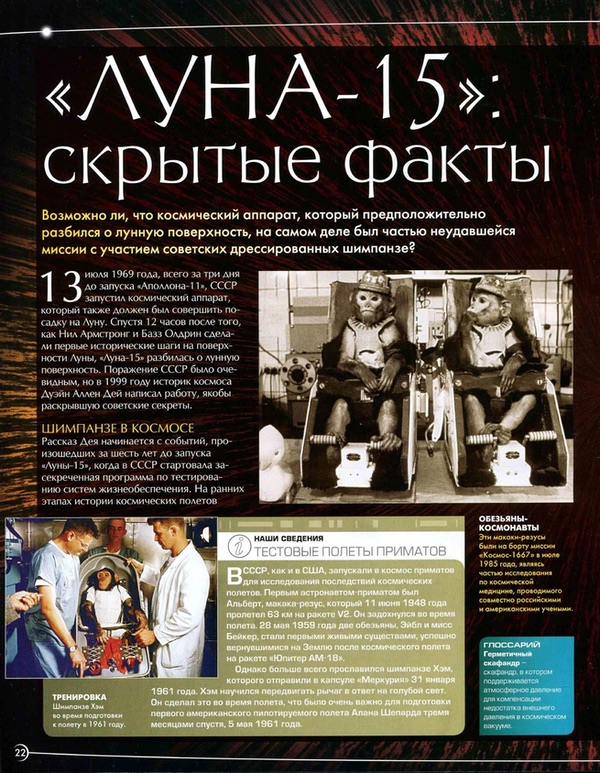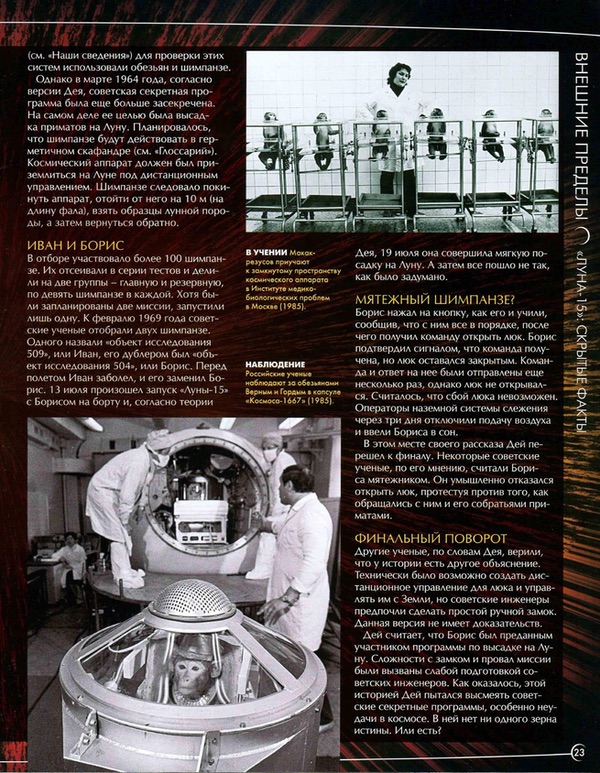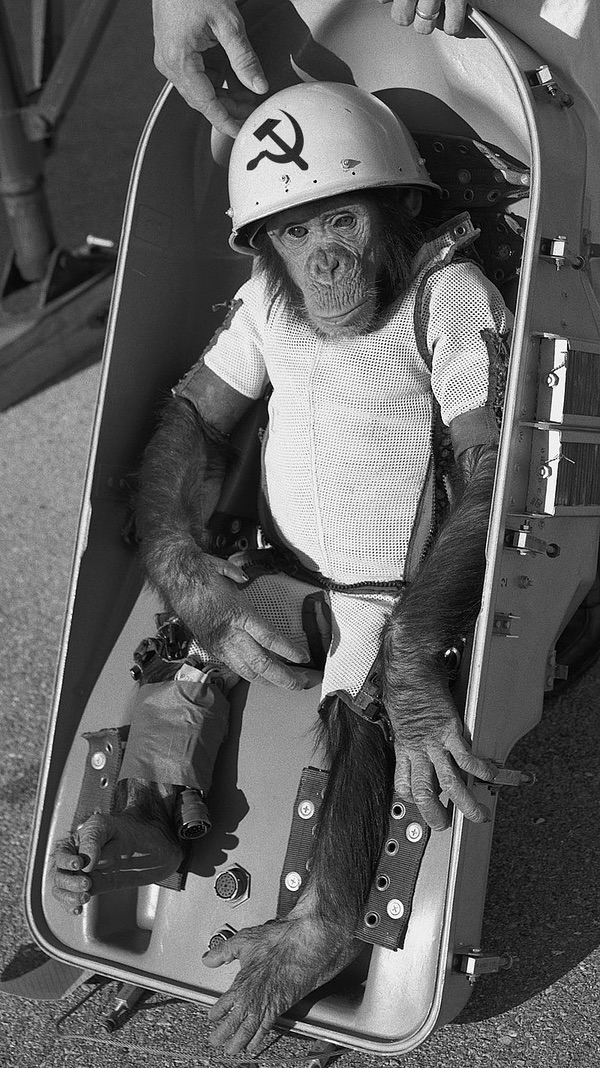Apollo RevisitedWhen a chimpanzee landed on the Moon: the saga of Boris (part 1)by Dwayne A. Day
|
| Another motivation that propelled me was frustration (well, exasperation) with some of the trivial obsessions of space enthusiasts, particularly those equivalents of baseball fans obsessed with the statistics of the game rather than, well, the game itself. |
Back in the 1990s I was a participant in an online space discussion forum, and came up with the idea of a fictional Soviet space program that rivaled Apollo. My idea was that, having realized they could not beat the Americans to the Moon with their existing equipment, the Soviet space leadership developed a plan that would upstage and make fun of the American lunar landing. Several events and experiences influenced me. One was the amount of information that was coming out of former Soviet archives about their space programs, some of it being actively uncovered by my friend Asif Siddiqi. Another thought was that not everything being reported on the Soviet space program was accurate, which made me realize that with just a little bit of effort, I could write a plausible “alternative history” that some people would believe, even if it did seem rather absurd.
And admittedly, another motivation that propelled me was frustration (well, exasperation) with some of the trivial obsessions of space enthusiasts, particularly those equivalents of baseball fans obsessed with the statistics of the game rather than, well, the game itself. There was then (it still exists) a perpetual discussion among some space history buffs about Apollo crew rotations whereby people speculated over 30 (now 50!) years after the fact about the crews of Apollos 18, 19, and 20, as well as what would have happened if, say, Michael Collins had caught the flu in June of 1969 and how that would have affected follow-on crew assignments. Closely coupled to this was an obsession among some space buffs over which astronauts were “better” than others (usually this was argument was based upon macho characteristics—for example, some argued that Joe Engle was an X-15 pilot with the Right Stuff who was unfairly bumped off of Apollo 17 in favor of some weenie scientist named Harrison Schmitt.)
So I had a great idea—create my own fake Moon landing story involving a chimpanzee—and I decided to start writing it. And then I enlisted some co-conspirators, notably Asif Siddiqi and Robert Kennedy, both of whom understood and wrote Russian. They offered suggestions about obscure technical details to add to the story and made some translations of phrases into Russian, so that my essay appeared to be based upon authentic Russian sources. In fact, some of it was based upon authentic Russian sources, which would be difficult for the average reader to track down, but could send somebody on a wild goose chase. References to previously published articles made it seem more legitimate. Asif even made a few suggestions that were very cleverly obscure, like model numbers of spacecraft, the kinds of things he assured me might make even knowledgeable Russian space experts scratch their chins. Maybe there was something to this story after all… some of them might think.
One of my ideas was to give the chimps numbers, so that people could argue endlessly about the order of the numbered chimps instead of astronauts with names. Another was to imply that the chimps were selected for missions based upon their devotion to Soviet ideology, and that one chimp was eliminated from a mission because of his amorous fling with one of his fellow chimps. The hero chimp, in my story, was number 504, who eventually received the name Boris. Boris landed successfully on the Moon, but could not get out of his spacecraft due to a faulty hatch—although Soviet officials believed that he had willfully disobeyed orders. Boris kept banging a wrench on the recalcitrant hatch until he eventually ran out of oxygen and died.
| And so that was that: I figured that maybe a few dozen to maybe a few hundred people had read it and it would be quickly forgotten. But over time, I realized that the “Boris the Moon Chimp” story had legs. |
The fake article contained many inside jokes and hints. One Soviet space expert was named “Oleg Adulbaz,” and “adulbaz” spelled backwards is “zabluda,” Serbo-Croatian for “delusion.” There was even a reference to a fictitious article by Jim Oberg titled “Red Monkeys in Orbit” and a nod to Oberg’s perpetual habit of bashing the commies in his articles.
Fueled by caffeine and a little too much self-confidence, I wrote the piece and then posted it to the Usenet sci.space.history discussion forum, which at the time was probably only read by a few hundred people at most, and had less than a couple of dozen regular participants. Some of the members instantly got the joke and made wink-wink references to it. Others assumed it was legitimate.
And so that was that: I figured that maybe a few dozen to maybe a few hundred people had read it and it would be quickly forgotten. Later, I considered the idea that my Boris story might make for a good graphic novel drawn in heroic style, with images of Soviet space chimps training in simulators, and maybe even with Boris in a red track suit running on a treadmill. The few times I revisited it, I thought about updating it, but the original story was so detailed that I could not figure out what more to add. I let it rest.
But over time, I realized that the “Boris the Moon Chimp” story had legs. In the mid-2000s I encountered a college student who informed me that he had given a public talk about the Boris story. He said that some in his audience had doubted the story, but he assured them it was accurate. After all, it had genuine bona fides, since a respected space historian had written about it. Er… I responded, unsure if he was pulling my leg, you realize that I made the whole thing up, right? He was shocked and embarrassed to learn the truth. The story also got entered into the Encyclopaedia Astronautica as a space myth.
I got another shock some years later when Asif Siddiqi sent me a copy of a Russian magazine that included a two-page article. I don’t read Russian, but Asif informed me that although the article did not fully embrace the Boris story, it indicated that the story could possibly be true. Yes, the made-up story that had appeared in English was now appearing in a Russian magazine.
 A Russian magazine published an article about Boris years after the story first appeared online.  |
But a far bigger surprise came last year, when I learned that there is—or at least was—an electronic rock band called BORIS CHIMP 504. In Spain.
| Still, it’s kinda cool that something that I wrote as a rather elaborate joke over two decades ago is somehow still inspiring people. |
The band was formed by Miguel Neto and Rodrigo Carvalho in 2010. Their Facebook page describes BORIS CHIMP 504 as “an audiovisual real-time performance that emphasizes audio synthesis and graphical languages in a futuristic Sci-Fi aesthetics. It's a real time interactive/reactive system between the audio and the image, between the man and the machine.” The band performed numerous times at music festivals between 2010 and 2013.
 A Spanish band is named BORIS CHIMP 504 after the mythical chimpanzee. |
I’ve never been to Spain (nor Oklahoma), and I don’t speak their language, but I do like their food. I have no idea how they learned about my Boris story or why they decided to name their band after my space chimp hero. BORIS CHIMP 504 still seems to be active, performing as recently as last year and working on a new audio visual event called “Vanishing Quasars.” Although I am a big fan of electronic music (see “Cruising through the cosmos on waves of sound,” The Space Review, May 13, 2013; and “Albedo 0.06: Vangelis returns,” The Space Review, October 3, 2016), my own interests lean toward ambient, not techno/trance (don’t ask me to explain the difference.) Still, it’s kinda cool that something that I wrote as a rather elaborate joke over two decades ago is somehow still inspiring people.
Boris, we still remember and honor you.
Next in part 2: The Boris the Moon chimp story.
Note: we are temporarily moderating all comments subcommitted to deal with a surge in spam.
